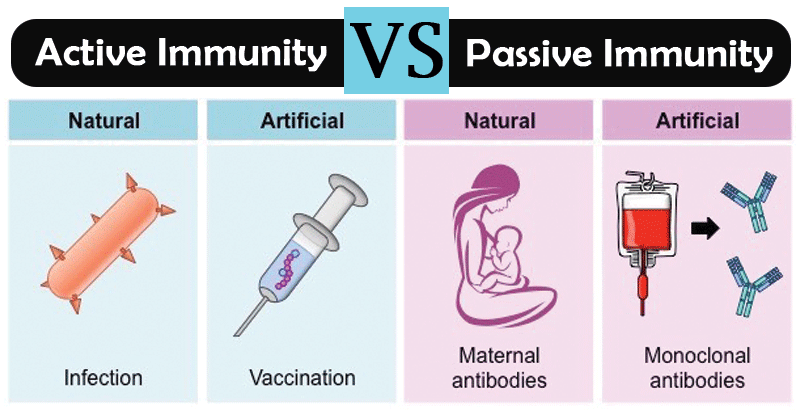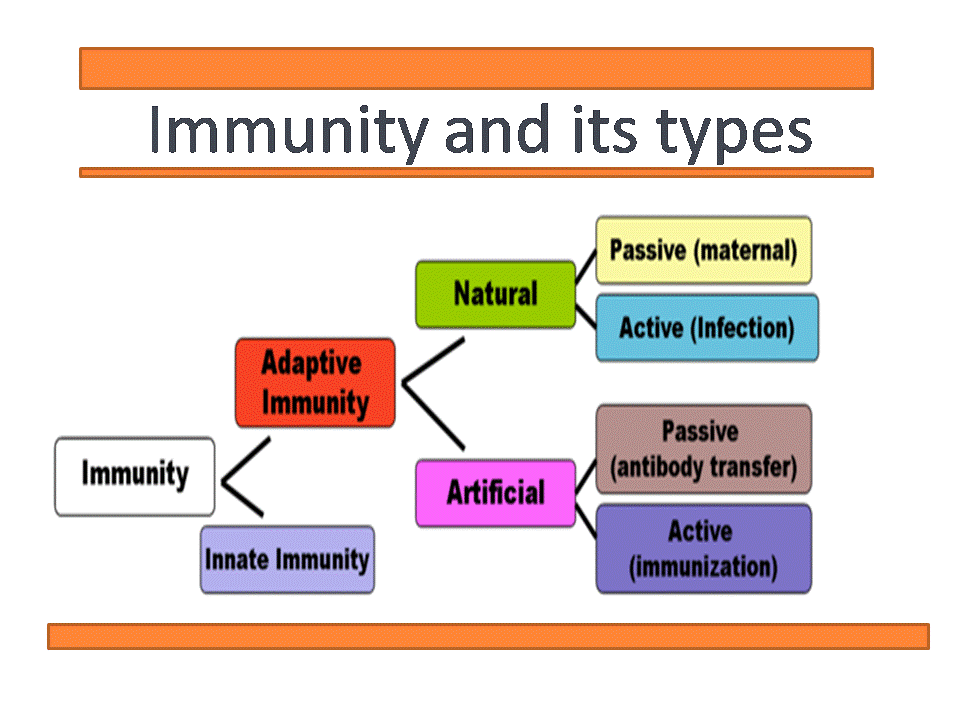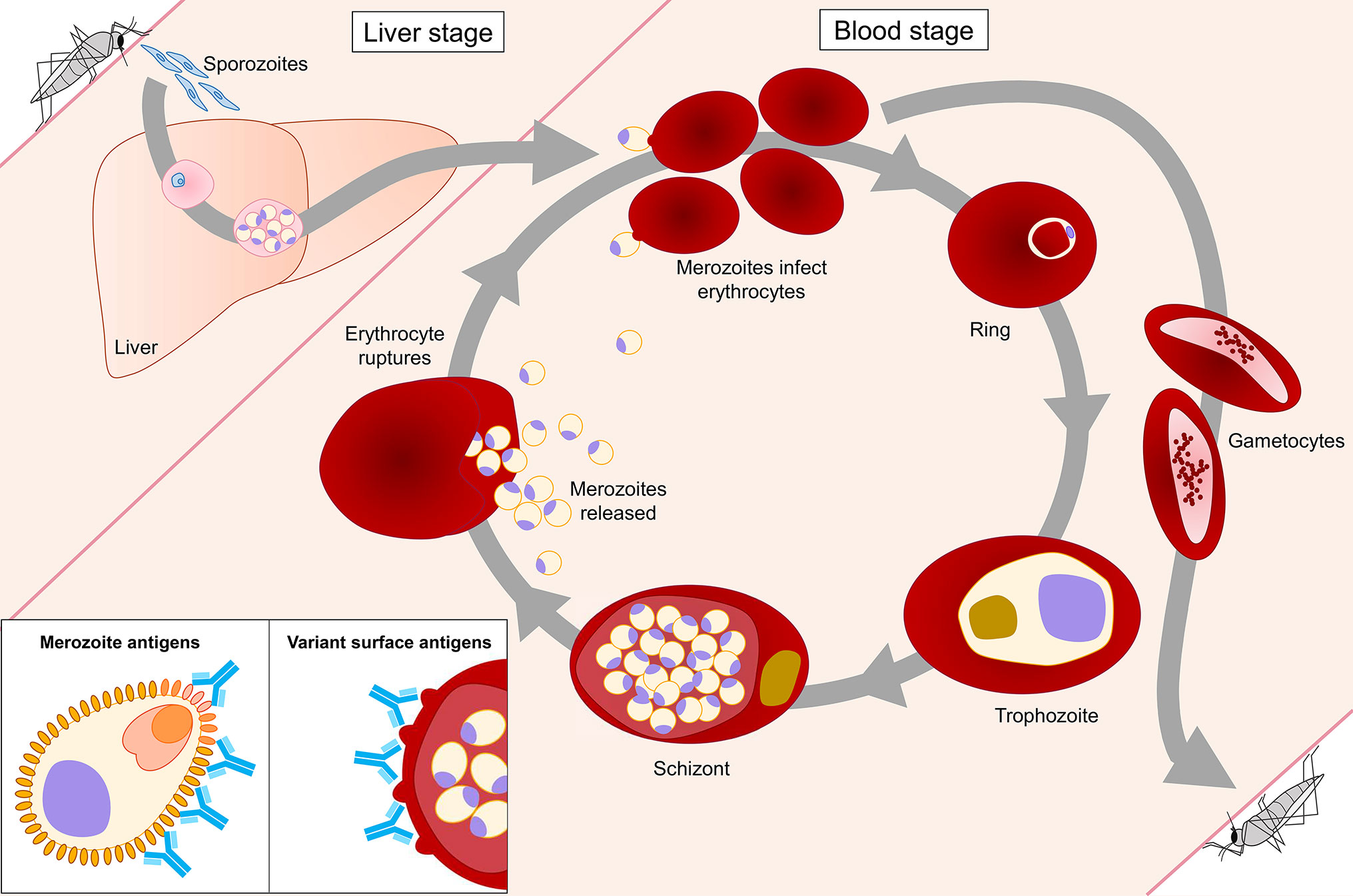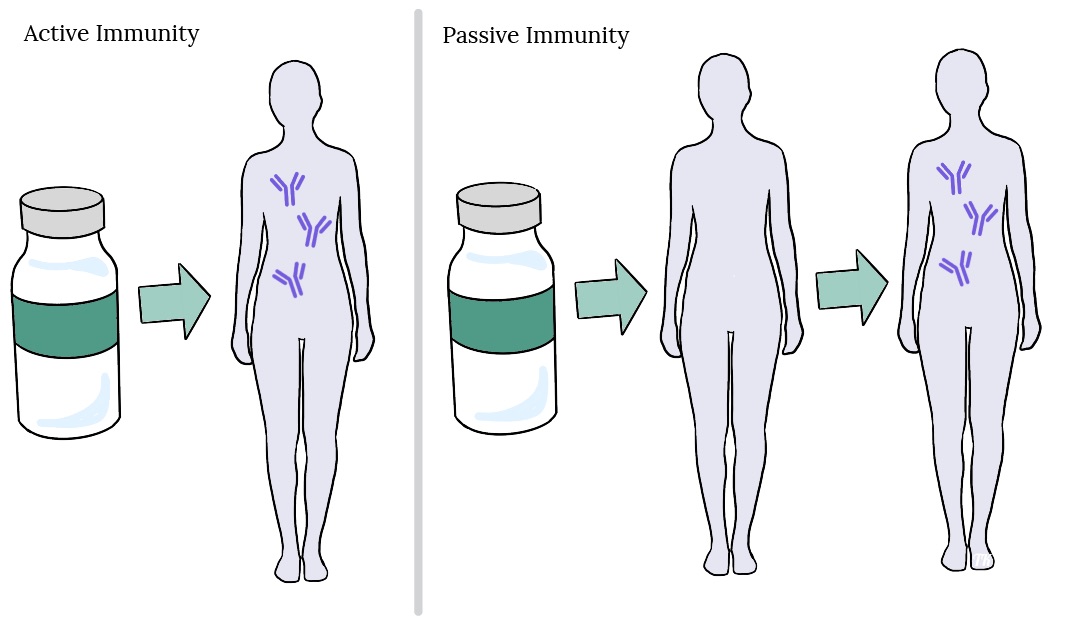8 Explain the Difference Between Passive and Active Immunity
Natural exposure or through vaccination. In English class we are taught the difference between active and passive voice.

Active Immunity Vs Passive Immunity Definition 19 Differences
Passive Immunity More The human immune system is a complex defense mechanism that aims to keep us healthy and safe from viruses bacteria and all other types of pathogens we might come.

. 1 Naturally 2 Vaccination. Two types of immunity exist active and passive. This article reviews active and passive immunity and the differences between them.
Passive immunity is introduced to the body with the help of external sources like vaccines breast milk etc which can provide immediate protection however not indefinitely. Immunity to infectious microorganisms can be achieved by active or passive immunization. This can result from of one or two ways.
Active Immunity takes days and weeks to create. Your immune system can be boosted through both active and passive immunity. Passive immunity is slower because.
Difference Between Active and Passive Immunity. Active immunity is developed in response to disease and therefore can last a lifetime once developed. When you are immune to a disease your immune system can fight off infection from it.
In each case immunity can be acquired either by 1. Innate immunity is general and non-specific it is also the first line of defence against pathogens. In this article we compare and contrast two types.
Active immunity refers to the process of introducing antigen in small amounts in an organism and let the organism produce antibodies in response to that. Typically antibodies are produced by white blood cells in. Whereas passive immunity is the result of the introduction of.
Active immunity is immunity from an immunogen and is acquired. Active vs Passive immunity. Natural or Innate immunity Acquired immunity Natural Immunity Natural immunity is inheritedtransmitted from parents to.
While active immunity occurs when an individual produces antibodies to a disease through his or her own immune system passive immunity is provided when a person is given antibodies. In active immunity the body produces its own antibodies while in passive immunity antibodies are directly administered to the body. In case of passive immunity antibodies and immune-competent cells are transferred from one organism to another to increase resistance against a pathogen.
Natural immunity is acquired from exposure to the disease organism through infection with the. Active and Passive immunity are the two categories of Adaptive immunityThe distinction between active and passive immunity is that active immunity is formed by antibodies generated in ones own body whereas passive immunity is developed by antibodies produced outside of the body and then injected into the body. Passive immunity is immunity conferred by an individual through the transmission of serum or.
There are two main types of immunity. A Venn Diagram showing Active vs Passive Immunity. Immunity is the bodys reistance to invasion by microorganism and damage by foreign subtances.
Immunity is defined as the bodys ability to protect itself from an infectious disease. Abstract Immunity is the state of protection against infectious disease conferred either through an immune response generated by immunization or previous infection or by other non-immunological factors. Passive immunity occurs when we are protected from a pathogen by immunity gained from someone else.
The ebook Focus on Pharmacology explains on page 114 that the active immunity is acquired immunity. Explain the difference between passive and active immunity. Active Immunity results when exposure to a disease organism triggers the immune system to produce antibodies to that disease.
Passive Immunity is a kind of Immunity. The method of acquiring a specific response can be natural or artificial. But after creating it stays for a lifetime.
You can edit this Venn Diagram using Creately diagramming tool and include in your reportpresentationwebsite. Active immunity occurs when our own immune system is responsible for protecting us from a pathogen. Jerry knocked over the lamp.
Natural processes usually by transfer from mother to fetus or by previous infection by the organism 2. The passive voice makes the subject the person or thing acted on or affected by the action represented by the verb. The active voice asserts that the person or thing represented by the grammatical subject performs the action represented by the verb.
There are two types of immunity. Active immunity can be acquired through natural immunity or vaccine-induced immunity. The term active immunity refers to a persons bodys immediate response to infections.
Active immunity is more common in our bodies than passive immunity. Active Immunity can happen in two ways. Activation can be active or passive where active means the immune cells responded to initiate the defenses and passive means the defense cells or proteins were made by someone elses immune system.
Immunity is the state or condition of being resistant to invading microorganisms Moini 2013 p. Also called acquired immunity this type of immunity is built up as we are exposed to diseases or get vaccinated. The word immunity is derived from a latin word Immunitas which means freedom from disease.
A prime difference between active and passive immunitylies in the method or the process by which you acquire it. Active vs Passive Immunity Difference between active and passive immunity. Knowing how these kinds of immunity work in relation to COVID-19 is vital in helping achieve immunity through.
Antibodies are proteins that bind to and help attack pathogens such as bacteria and viruses. And Google dictionary states that this acquired immunity is from either the development of antibodies as a response to antigen exposure 1 from vaccination or 2 an attack of an infectious disease. Active immunization involved administering an immunogen that might be live attenuated killed inactivated toxoid or subunit in origin.
Which takes more time to develop. Artificial means such as injection of antibodies or Vaccines. They are a key component of the human immune system.
Please list two examples of each. Passive immunity provides short-term protection against infection. Difference Between Adaptive Immunity and Innate Immunity.
Active immunity offers long-term or even lifetime protection while passive immunity is only effective for a short period of time. Both of these different types of immunity can be acquired in different ways. Active and passive immunity both serve this purpose but are different in how antibodies are created Active Immunity.
Passive immunization involved giving pre-formed antibodies usually to very recently exposed individuals. The main difference is in how antibodies were introduced into the body.

Passive And Active Immunity Flashcards Quizlet

Active Vs Passive Immunity Differences And Definition Technology Networks

Difference Between Active And Passive Immunity In Tabular Form

Immunity And Its Types Bharat Biotech

What Is The Result When A Dendritic Cell Phagocytizes A Microbe And Processes It In 2022 Survivor Tv Show Immune Response Toll Like Receptor

Active Vs Passive Immunity Differences And Definition Technology Networks

Acquired Immunity What Is It And How Do You Get It

Immunity And Its Types Innate And Acquired Immunity Online Biology Notes

Adaptive Immunity Immune Response Article Khan Academy

Immunity Immunity Nursing Immune System Immunology

Frontiers Naturally Acquired Humoral Immunity Against Plasmodium Falciparum Malaria Immunology

Immunity And Its Types Bharat Biotech

8 11 3 Types Of Immunity Passive V Active Youtube

Chapter 21 The Immune System 21 5 21 6 Flashcards Quizlet

Difference Between Active Immunity And Passive Immunity Youtube

What Is Immunity Vaccine Practice For Health Professionals 1st Canadian Edition



Comments
Post a Comment